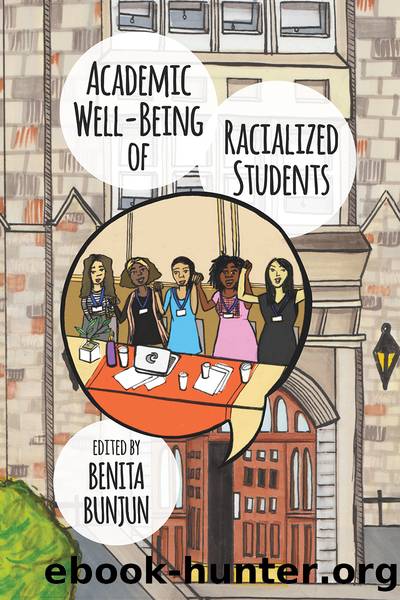Academic Well-Being of Racialized Students by Benita Bunjun

Author:Benita Bunjun
Language: eng
Format: epub
Publisher: Fernwood Publishing
Published: 2021-03-15T00:00:00+00:00
Chapter 8
Envisioning an Intersectional Resilience Mentorship Program for Indigenous and International Students
Tammy Williams (Apukjiâi Eâpit)
There is a shared culture shock that occurs when Indigenous and international students come to university in Kjipuktuk (Halifax), leading to negative impacts on education, mental health, food security, and access to health care (Adler 1975). This chapter outlines the Intersectional Resilience Mentorship Program (irmp), a mutual-mentorship program that provides space for Indigenous and international students to increase personal resilience, thus leading to increased retention rates and decreased impacts of adversity on their mental and emotional well-being. This chapter provides the initial background research, as well as analysis of western theorists in resilience (Connor and Davidson 2003), knowledge transfer, learning theory (Baker and Taylor 1995; Merriam & Kim 2011), and evaluation (Connor and Davidson 2003).
This chapter lays the groundwork for future research into the decolonization of mentorship using traditional forms of knowledge transfer for Indigenous and post-colonial international students using appreciative inquiry and storytelling. The irmp uses a two-eyed seeing approach that blends western research and Indigenous knowledge to analyze the research and to develop the programâs framework and evaluations. The chapter uses traditional Miâkmaw knowledge transfer methods, such as a talking circle in combination with an appreciative inquiry (ai) approach (Cooperrider and Whitney 2001), as well as other non- and de-colonized methods.
Culture Shock
Culture shock is a transitional experience for students as they go through stages of contact, disintegration, reintegration, autonomy, and independence (Adler 1975). The student initiates contact with a second culture and the differences cause confusion; noticeable differences in behaviours, values, and attitudes become obvious with the student feeling different, isolated, and possibly depressed, giving rise to a âdisintegration of personalityâ (Adler 1975: 16). Reintegration is marked by phases of hostility toward the second culture and withdrawal from the second culture. When reintegration is especially tough on the student, the reintegration phase includes the desire to return home. This is where many of the Indigenous students leave the city and go back to their home communities, which leads to low retention rates for the university. If the student can surpass the reintegration stage, autonomy marks the beginning of learning about the second culture and learning how to survive without their first-cultureâs social cues; the student begins to straddle both cultures, adapting to life within both cultures. Once the Indigenous or international student reaches the independence stage, they have learned to navigate the second culture and gain independence from its cultural influences, leading to a happier, more fulfilled life with the ability to self-actualize (Adler 1975).
Some of the issues that were identified by the presenters at the Third Annual cirfs Student Conference, on March 16, 2019, revolved around the cultural differences that Indigenous and international students experience, as well as the lack of adequate resources that they need to fulfill their basic human needs. Systemic racism in Nova Scotia has prevented Saint Maryâs Universityâs (smu) racialized students from accessing adequate housing, employment, health and mental health services, and more. Navigating these complex systemic obstacles requires
Download
This site does not store any files on its server. We only index and link to content provided by other sites. Please contact the content providers to delete copyright contents if any and email us, we'll remove relevant links or contents immediately.
The Art of Coaching Workbook by Elena Aguilar(51144)
Trainspotting by Irvine Welsh(21618)
Twilight of the Idols With the Antichrist and Ecce Homo by Friedrich Nietzsche(18610)
Fangirl by Rainbow Rowell(9218)
Periodization Training for Sports by Tudor Bompa(8240)
Change Your Questions, Change Your Life by Marilee Adams(7724)
This Is How You Lose Her by Junot Diaz(6862)
Asking the Right Questions: A Guide to Critical Thinking by M. Neil Browne & Stuart M. Keeley(5745)
Grit by Angela Duckworth(5587)
Red Sparrow by Jason Matthews(5456)
Paper Towns by Green John(5167)
Room 212 by Kate Stewart(5094)
Ken Follett - World without end by Ken Follett(4711)
Housekeeping by Marilynne Robinson(4428)
The Sports Rules Book by Human Kinetics(4372)
Double Down (Diary of a Wimpy Kid Book 11) by Jeff Kinney(4254)
Papillon (English) by Henri Charrière(4241)
The Motorcycle Diaries by Ernesto Che Guevara(4078)
Exercise Technique Manual for Resistance Training by National Strength & Conditioning Association(4051)
